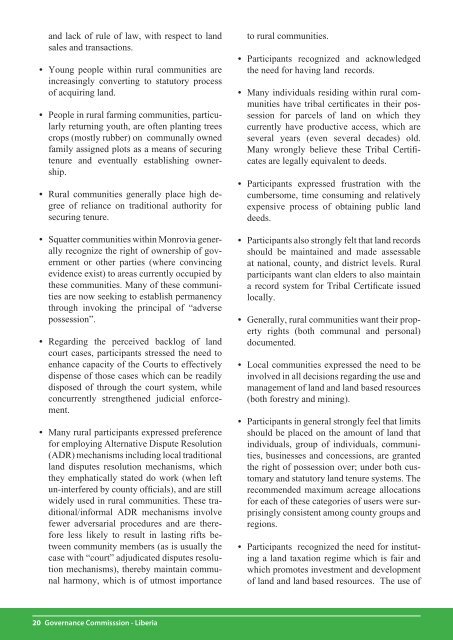Report: Regional Consultative Meetings on Land - Land Commission
Report: Regional Consultative Meetings on Land - Land Commission
Report: Regional Consultative Meetings on Land - Land Commission
Create successful ePaper yourself
Turn your PDF publications into a flip-book with our unique Google optimized e-Paper software.
and lack of rule of law, with respect to land<br />
sales and transacti<strong>on</strong>s.<br />
• Young people within rural communities are<br />
increasingly c<strong>on</strong>verting to statutory process<br />
of acquiring land.<br />
• People in rural farming communities, particularly<br />
returning youth, are often planting trees<br />
crops (mostly rubber) <strong>on</strong> communally owned<br />
family assigned plots as a means of securing<br />
tenure and eventually establishing ownership.<br />
• Rural communities generally place high degree<br />
of reliance <strong>on</strong> traditi<strong>on</strong>al authority for<br />
securing tenure.<br />
• Squatter communities within M<strong>on</strong>rovia generally<br />
recognize the right of ownership of government<br />
or other parties (where c<strong>on</strong>vincing<br />
evidence exist) to areas currently occupied by<br />
these communities. Many of these communities<br />
are now seeking to establish permanency<br />
through invoking the principal of “adverse<br />
possessi<strong>on</strong>”.<br />
• Regarding the perceived backlog of land<br />
court cases, participants stressed the need to<br />
enhance capacity of the Courts to effectively<br />
dispense of those cases which can be readily<br />
disposed of through the court system, while<br />
c<strong>on</strong>currently strengthened judicial enforcement.<br />
• Many rural participants expressed preference<br />
for employing Alternative Dispute Resoluti<strong>on</strong><br />
(ADR) mechanisms including local traditi<strong>on</strong>al<br />
land disputes resoluti<strong>on</strong> mechanisms, which<br />
they emphatically stated do work (when left<br />
un-interfered by county officials), and are still<br />
widely used in rural communities. These traditi<strong>on</strong>al/informal<br />
ADR mechanisms involve<br />
fewer adversarial procedures and are therefore<br />
less likely to result in lasting rifts between<br />
community members (as is usually the<br />
case with “court” adjudicated disputes resoluti<strong>on</strong><br />
mechanisms), thereby maintain communal<br />
harm<strong>on</strong>y, which is of utmost importance<br />
20 Governance Commisssi<strong>on</strong> - Liberia<br />
•<br />
to rural communities.<br />
Participants recognized and acknowledged<br />
the need for having land records.<br />
• Many individuals residing within rural communities<br />
have tribal certificates in their possessi<strong>on</strong><br />
for parcels of land <strong>on</strong> which they<br />
currently have productive access, which are<br />
several years (even several decades) old.<br />
Many wr<strong>on</strong>gly believe these Tribal Certificates<br />
are legally equivalent to deeds.<br />
• Participants expressed frustrati<strong>on</strong> with the<br />
cumbersome, time c<strong>on</strong>suming and relatively<br />
expensive process of obtaining public land<br />
deeds.<br />
• Participants also str<strong>on</strong>gly felt that land records<br />
should be maintained and made assessable<br />
at nati<strong>on</strong>al, county, and district levels. Rural<br />
participants want clan elders to also maintain<br />
a record system for Tribal Certificate issued<br />
locally.<br />
• Generally, rural communities want their property<br />
rights (both communal and pers<strong>on</strong>al)<br />
documented.<br />
• Local communities expressed the need to be<br />
involved in all decisi<strong>on</strong>s regarding the use and<br />
management of land and land based resources<br />
(both forestry and mining).<br />
• Participants in general str<strong>on</strong>gly feel that limits<br />
should be placed <strong>on</strong> the amount of land that<br />
individuals, group of individuals, communities,<br />
businesses and c<strong>on</strong>cessi<strong>on</strong>s, are granted<br />
the right of possessi<strong>on</strong> over; under both customary<br />
and statutory land tenure systems. The<br />
recommended maximum acreage allocati<strong>on</strong>s<br />
for each of these categories of users were surprisingly<br />
c<strong>on</strong>sistent am<strong>on</strong>g county groups and<br />
regi<strong>on</strong>s.<br />
• Participants recognized the need for instituting<br />
a land taxati<strong>on</strong> regime which is fair and<br />
which promotes investment and development<br />
of land and land based resources. The use of


